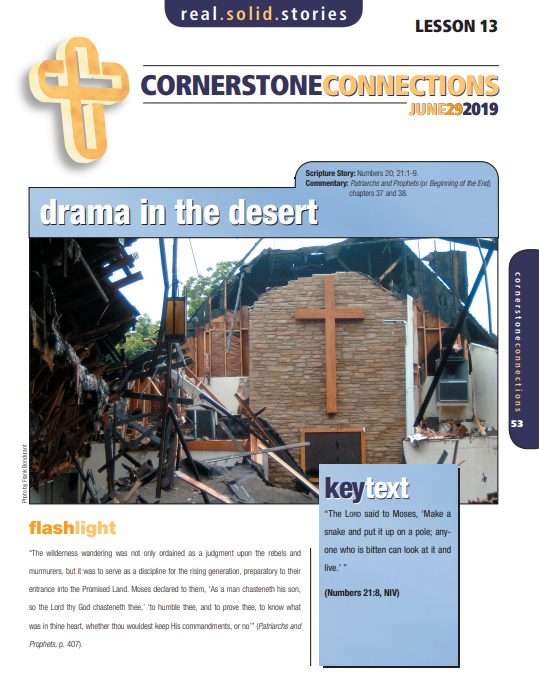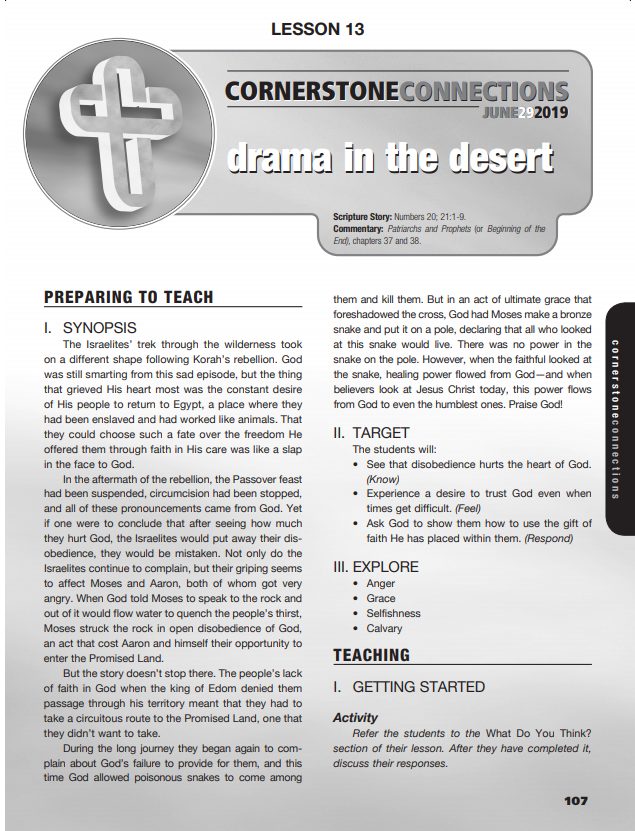Click below to download the Cornerstone Connections leader’s guide and student lesson. This week’s resources also include two lesson plans and a discussion starter video which offer different ways of looking at the topic. Each lesson plan includes opening activities, scripture passages, discussion questions, and real-life applications.
How long can you stand on one foot without moving? There is a story in Jewish tradition about a gentile who once came to a Jewish rabbi and asked him to condense the Scriptures into a message short enough that he could hear it all—and understand it—while he was standing on one foot. Today we’re going to try something similar!
Invite all the Youth Sabbath School participants to stand on one foot for as long as they can. To challenge them further, ask them to give their summary of the essence of God’s law while they’re doing it (a good answer might be what Jesus said in the New Testament: “Love God with all your heart, and love your neighbor as yourself”) or to, while keeping their leg bent, raise their foot as high up as their knee. (If there are any teens wearing dresses or skirts, they can bend their knee so their foot goes up behind them, with their heel up.)
If your participants drop their feet and end this exercise too quickly, give the whole group another try. Some individuals are quite good at this, while others might stumble or wobble back and forth to maintain their balance. Gymnasts and other athletes will have a clear advantage here!
Little children often like to brag about how old they are. They say things like, “I’m four years old!” or “I’m four and a half!” (And that half will matter a lot.) As you get older, some ages become milestones—when you turn 13, you become a teenager; when you turn 16, you can get a driver’s license; when you turn 18, you’re legally considered in adult—at least in some circles, including the US; and when you turn 21, you’re pretty much considered an adult in the rest of those circles.
However, once many people reach adulthood, they start to become less excited about those milestones. For example, turning 30 can feel like a negative thing, and a lot of people will think something like, “30? I’m getting so old!” In a similar way, when you turn 40, you’re considered “over the hill”; when you turn 50, you’ve either begun to or will soon experience a loss of physical vitality; and when you turn 60, you’ve reached retirement age and can be considered truly “old” by many people!
Eventually, however, things return to bragging. “My grandpa is almost 90!” someone might say, because for this person age now seems like an accomplishment and something to be proud of again. If someone turns 100, there’s likely to be a big celebration in their family and even more bragging.
But this is because we expect people to die before they reach 100, don’t we? We consider it tragic when someone younger than 60 dies—thinking something like, “Their life was cut short!” and taking it as an especially great shock if the person was a teenager, even if they had a prolonged disease or terminal illness. But when someone turns 100, we feel like someone has beaten the odds and lived a really long time! In some cases, those people have experienced historical events the rest of us have only read about.
Ask the Youth Sabbath School participants if they have any relatives who lived for a long time before they died. Have some volunteers share a few stories or memories about whoever this person is to them. This could be someone like a great-grandparent, a great-uncle, or a great-aunt. The participants might also have only seen them occasionally in their lives, especially if they lived a long distance away from each other.
The purpose of sharing this information is not to make the atmosphere of your Youth Sabbath School sad or morose, but to acknowledge that while we may not like the idea of death, we expect it to come for everyone eventually. Some of your participants might conclude with a statement along the lines of, “Well, they got a live a long time,” or “Their time finally came.” If you want to make this experience even more personal for your participants, ask them how long they would like to live and why.
As Christians, we believe that God created us to live forever. But because sin results in death, and because we live on this planet of sin, each of us will die. That’s why Christ’s gift of eternal life is so amazing, and so difficult for some people to believe!
As you consider our lesson for today, you might start to wonder how much longer Moses can put up with the drama and constant complaining from the Israelites against him and Yahweh. In the Scripture we’re going to read today, you’ll hear not only about the deaths of Moses’ older sister and brother, but also the deaths of more Israelites (this time from snake bites). We’re going to read about a lot of stuff that happens in the desert this week, but also about hope that only Yahweh can provide.

This is a short video clip you can show your Youth Sabbath School to illustrate this week’s topic, plus a few follow-up questions to spark discussion afterwards.
Create a video that illustrates how a similar kind of drama as the one Moses experienced (the Israelites’ repeated complaining) can get to somebody and wreak negative results when they can’t take it any longer. You could also take an angle that demonstrates the kinds of negative circumstances that can lead to complaining—then give them a different twist than what a viewer would usually expect. Remember to create a list of follow-up questions to go with your video as well so your participants can discuss it afterwards.
This 2:21-minute video is about why Moses wasn’t allowed into the Promised Land. (Hint: It’s based on the Scripture passage we’re studying this week.)



